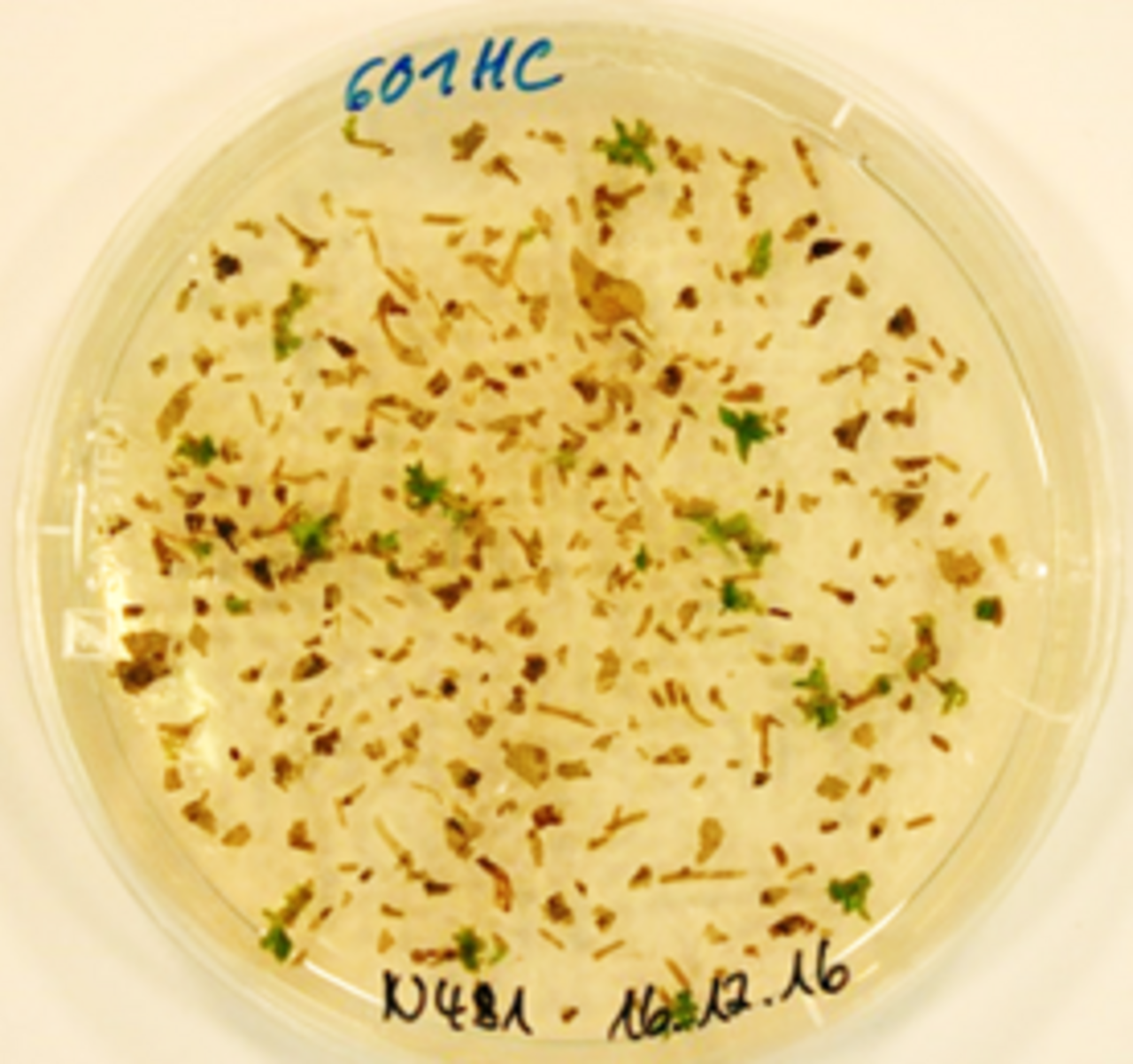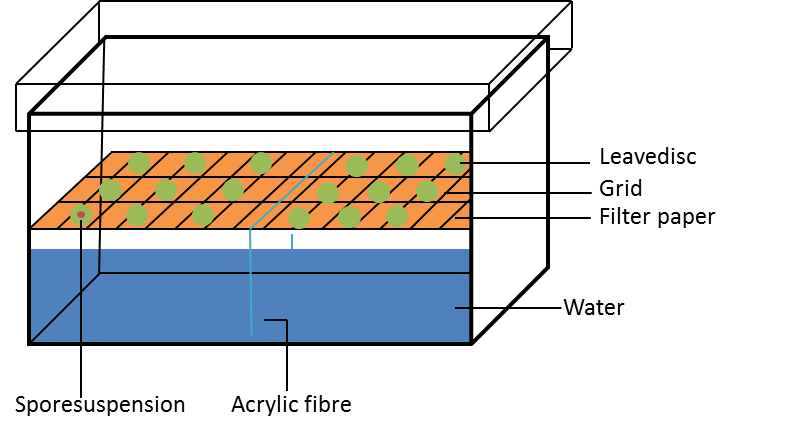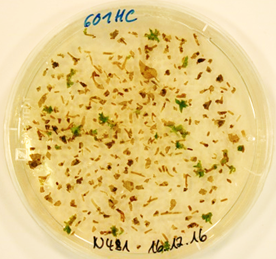Project
ChitoPop

Improvement of poplar pathogen response und mycorrhization by modification of LysM proteins
Poplars can recognize harmful fungi via receptors that bind specifically to chitin, a component of the cell wall of many fungi.The perception of the chitin triggers an immune response in poplars that can lead to resistance to the invader.In this project, the involved genes are to be characterized.In addition, the fitness of the poplar should be strengthened by promoting (mycorrhization) fungi that colonize roots and are conducive to growth (symbiotic fungi; mycorrhizal fungi).
Background and Objective
Poplars are grown in short rotation coppice for the production of bioenergy. During the entire period, the plantation is constantly exposed to various fungal pathogens that can cause serious damage to the trees. Most of these harmful fungal pathogens in poplar are fungi of the Melampsora genus. In particular, the cosmopolitan species M. larici-populina poses the greatest threat to poplar plantations, causing annual growth losses of up to 50 percent. When attacked by harmful fungi, the plant's immune system reacts with a defense reaction that is mediated by a complex molecular mechanism. The fungal chitin is initially recognized via special receptors. The perception of chitin triggers an immune response in plants that can lead to resistance to the invader. On the other hand, symbiotic fungi must evade or suppress this immune response in order to establish mycorrhization. The aim of the project is to identify and functionally characterize the various components involved in this defense reaction in poplars. In addition, it should be clarified how the poplar can distinguish between harmful fungi and symbiotic fungi. This should lay the foundations for optimizing the pathogen resistance and mycorrhization of poplars.
Approach
In this project, we want to identify genes coding for LysM-RLKs receptors in poplar and LysM effectors in the mycorrhizal fungus Laccaria. These genes will be functionally characterized and tested in poplar to improve the immune response and simultaneously the mycorrhization potential of poplar. For this, we both will generate transgenic lines and apply the CRISPR / Cas9-technology for a targeted modification of selected LysM-RLKs receptor genes.
For the candidate genes identified by project partner 1 by in silico analysis in P. trichocarpa and their paralogues (Potri.005G128400 / Potri.007G032300 and Potri.008G160600 / Potri.010G078700), homologous sequences from available P1 genome sequences were bioinformatically filtered out.
Using the CRISPR/Cas9 construct for modification in Potri.005G128400 and Potri.007G032300, a total of 133 regenerates could be generated for Potri.005G128400, of which 113 independently transgenic lines were used for DNA sequencing after analyzing the integrity of the construct. There was a distribution of 62 heterozygous modified lines, 40 homozygous modified lines and 11 lines corresponding to the wild type. Of the 40 homozygous modified lines, 6 different modifications occurred. In the course of the work, it became apparent that when these lines were amplified, only one of the two alleles of P. × canescens was amplified. Unfortunately, the number of lines was greatly reduced in advance, so that the remaining lines had to be tested again for a modification in the second allele. The selected lines for which a modification in Potri.005G128400 could be detected in one of the two alleles then also showed a modification in the second allele. The modification was homozygous for one of the selected lines, heterozygous biallelic for all others.
These lines were transferred to the greenhouse for phenotypic analysis. Furthermore, RNA isolations from the selected lines were carried out in order to verify a modification at the cDNA level as well. For this purpose, RNA was isolated from leaf and root material, transcribed into cDNA and amplified by means of PCR. It was found for Potri.005G128400 that the same modifications are present in cDNA from roots, only one line had an additional modification with a deletion of 5 nt instead of the insertion of a single nucleotide. The cDNA analysis from leaf material showed superimposed chromatograms in 3 out of 7 lines, although only one of the two alleles was amplified. This indicates chimeric structures. PCR amplification is currently being used to check whether the cDNA samples produced are based exclusively on RNA or whether they are contaminated with DNA. Two lines modified independently in Potri.005G128400 have already been handed over to project partner P3 (Dr. Stephanie Werner, Institute of Plant Biochemistry, Halle) for mycorrhization experiments.
Thünen-Contact

Involved Thünen-Partners
Involved external Thünen-Partners
- Georg-August-Universität Göttingen
(Göttingen, Deutschland)
Funding Body
-
Federal Ministry of Education and Research (BMBF)
(national, öffentlich)
Duration
10.2016 - 10.2022
More Information
Project status:
finished
Publikationen zum Projekt
- 0
Deecke K, Fladung M (2021) Melampsora-Resistenztests in Pappeln. AFZ Der Wald 76(4):26-29
- 1
Brügmann T, Polak O, Deecke K, Nietsch J, Fladung M (2019) Poplar transformation. Meth Mol Biol 1864:165-177
- 2
Fladung M, Ewald D (2018) Biotechnologie schnellwachsender Baumarten. In: Veste M, Böhm C (eds) Agrarholz - Schnellwachsende Bäume in der Landwirtschaft : Biologie - Ökologie - Management. Wiesbaden: Springer Spektrum, pp 147-168, DOI:10.1007/978-3-662-49931-3_6
- 3
Fladung M, Lipka V, Petutschnig E, Werner S, Teichmann T (2018) ChitoPop improvement of poplar pathogen response and mycorrhization by modification of LysM proteins. In: Conference Documents Plant 2030 Status Seminar 2018, February 5-7. pp 47-48
- 4
Bartsch D, Bendiek J, Bräuning A, Ehlers U, Dagand E, Duensing N, Fladung M, Franz C, Groeneveld E, Grohmann L, Habermann D, Hartung F, Keilwagen J, Leggewie G, Matthies A, Middelhoff U, Niemann H, Petersen B, Scheepers A, Tebbe CC, et al (2018) Wissenschaftlicher Bericht zu den neuen Techniken in der Pflanzenzüchtung und der Tierzucht und ihren Verwendungen im Bereich der Ernährung und Landwirtschaft : überarbeitete Fassung vom 23.02.2018 [online]. BVL; MRI; TI; BfR; FLI, 83 p, zu finden in <https://www.bmel.de/SharedDocs/Downloads/Landwirtschaft/Pflanze/GrueneGentechnik/Bericht_Neue_Zuechtungstechniken.pdf> [zitiert am 20.03.2018]
- 5
Fladung M (2017) Debate is failing Europe's geneticists. Nature 544:35


